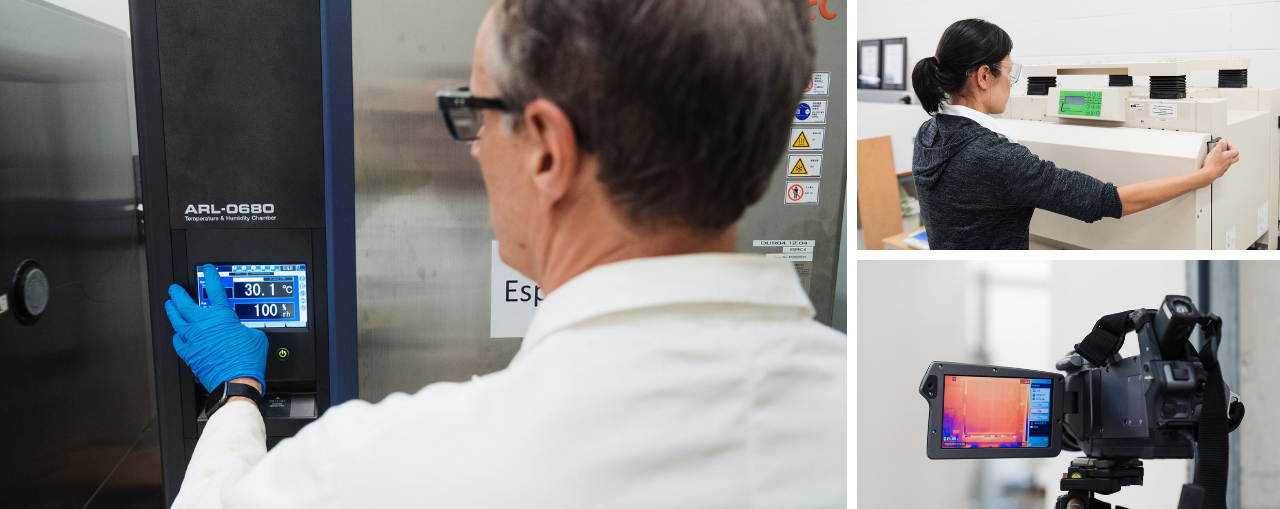
What we do
BRANZ research has contributed extensively to development of Building Code requirements and standards for thermal performance of building materials. Through our consultancy and testing services, we assist manufacturers, designers and the wider industry to improve the thermal performance of insulation materials and of buildings.
Why work with us?
BRANZ is accredited by International Accreditation New Zealand (IANZ) for measuring the properties of thermal insulation materials using the test method in:
- ASTM C518-21 Standard test method for steady-state thermal transmission properties by means of the heat flow meter apparatus
- AS/NZS 4859.1:2018 Thermal insulation of materials for building - Part 1: General criteria and technical provisions.
The properties we are accredited for measuring include:
- thermal transmission properties of thermal insulation and other materials
- thermal resistance of low-density batt and blanket-type mineral fibre insulation
- thickness and density of blanket or batt thermal insulation
- adjusting thermal properties to a declared temperature in accordance with AS/NZS 4859.2 clause 5.2.
See Applied Physics Testing Laboratory (37) [PDF, 175KB]
Our testing apparatus including LaserComp Fox600 and Fox801 Heat Flow Meters
- Measurement of steady-state heat flux and thermal transmission properties using
standard test method ASTM C518 - Accuracy of a single measurement, least uncertainty of measurement of 2% for both
thermal resistance and conductivity - Maximum plate spacing of 300 mm for FOX 801 and 200 mm for FOX 600
Determination of test thickness
For compressible insulation materials, thermal conductivity and resistance shall be measured at the lesser of nominal thickness and actual measured thickness.
For non-compressible insulation materials where the samples are greater than nominal thickness and cannot be compressed, the thermal measurement shall be determined at actual thickness.
Mean test temperature
Thermal conductivity and resistance are determined at a standard mean temperature of 23 °C for products sold in Australia. For products sold in New Zealand the thermal conductivity and resistance are determined at a standard mean temperature of 23 °C then converted to 15 °C in accordance with AS/NZS 4859.2 Clause 5.2.
Other types of thermal testing and expertise
We also offer consultancy and testing in the following areas:
- Determining ageing factor and ageing thermal resistance of PUR, PIR, PF and XPS rigid foams in accordance with AS/NZS 4859.1 Section 8 (EN 13164, EN 13165, EN 13166)
- Providing reference samples for Interlaboratory comparison exercise
- Heat flow meter calibration
- Statistical data analysis in accordance with AS/NZS 4859.1
- In situ measurement of thermal conductivity using large-area heat flux sensors
- Precision measurement of thickness and loft recovery of fibrous thermal insulation, including to ASTM C167-18 Standard test methods for thickness and density of blanket or batt thermal insulations
- To suppliers of equipment for thermal insulation thickness measurement
- Specific thermal design
- Computer modelling of heat flows in buildings
- Combined heat and moisture performance simulation of buildings and structures
- Measurement of whole-building energy efficiency
- Thermal imaging to detect heat loss
- Heat capacity measurement.
Enquire about insulation and thermal performance testing
Get in touch with the team to discuss how our testing services can assist you by emailing thermaltesting@branz.co.nz or give us a call on +64 4 237 1170.